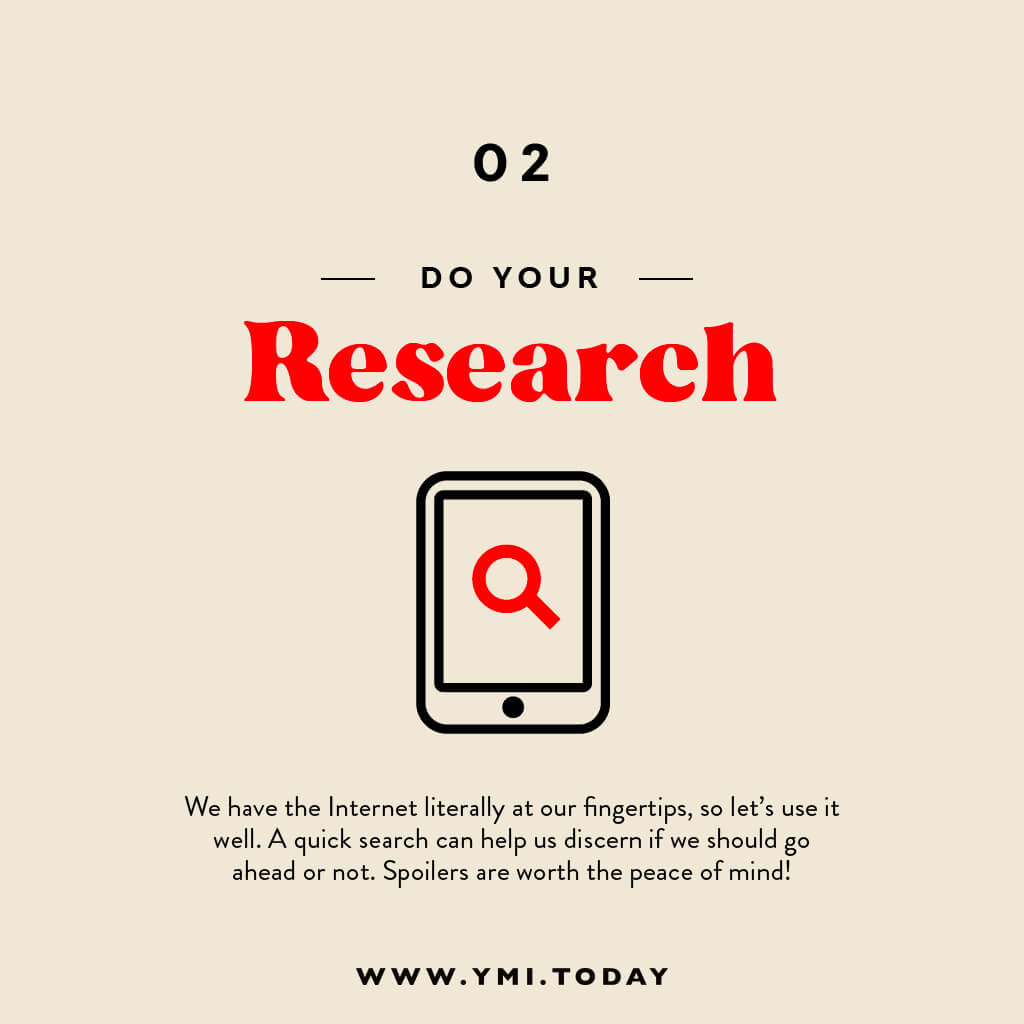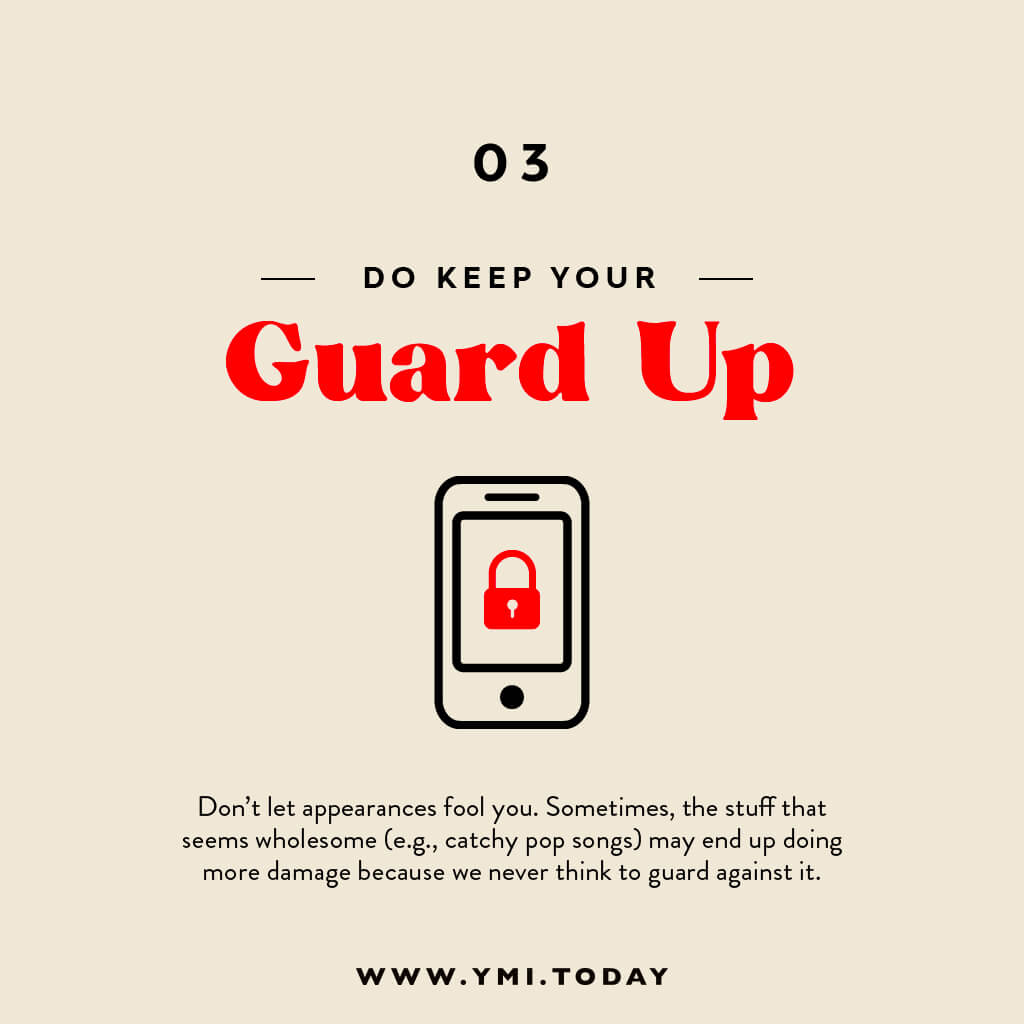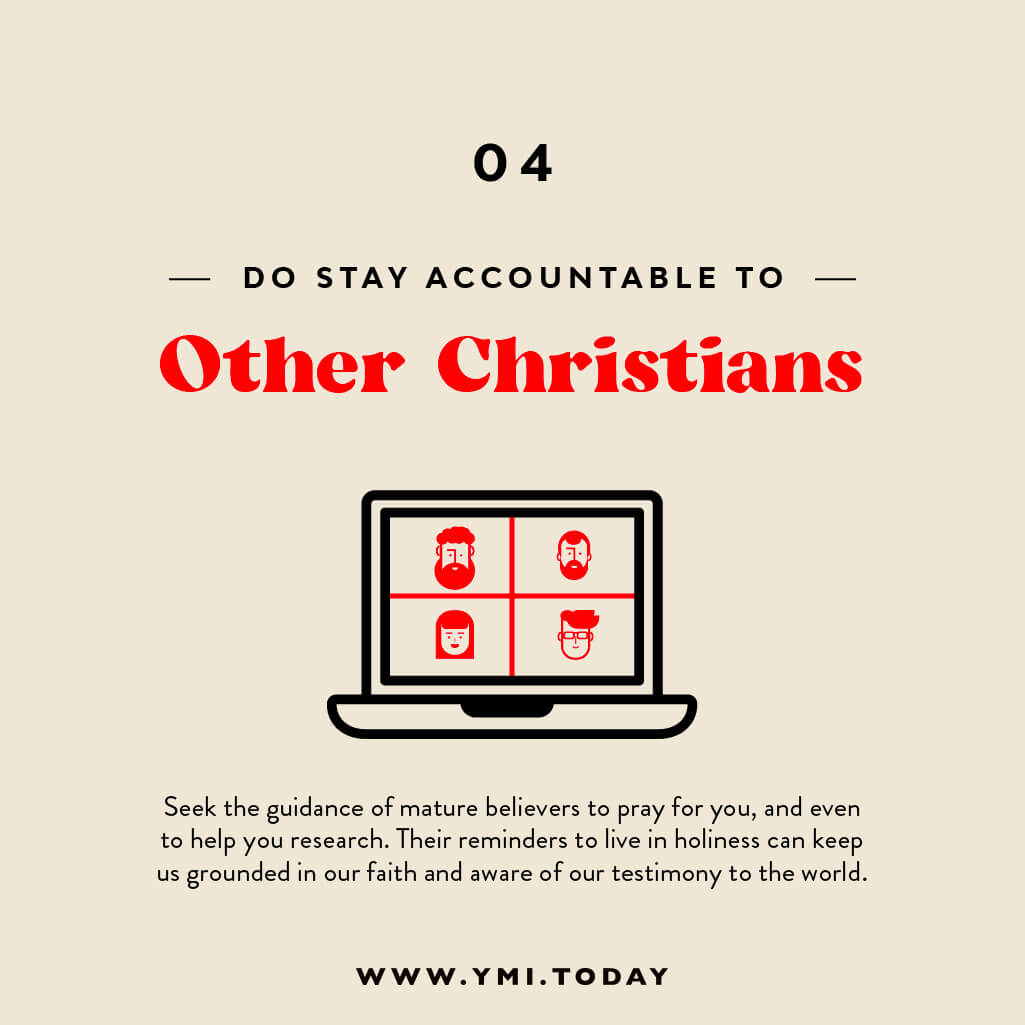4 Dos in Tackling “Un-Christian” Media
Confession: I have a thing for media with a magical or supernatural bent.
It started in my childhood with R. L. Stine’s Goosebumps and Christopher Pike’s Spooksville books, and as I grew up, I got into Buffy the Vampire Slayer, Charmed, and, naturally, that magical behemoth of pop culture phenomena, Harry Potter. Most recently, I finished the first season of the Neil Gaiman-helmed short series Good Omens.
However, at the Christian institution where I spent my primary and secondary school years, this type of media was definitely frowned upon. I sat through several assemblies on how Harry Potter was glorifying witchcraft and teaching children to get into Wicca (a religion often associated with witchcraft and occultism). Pokémon was banned from school grounds because the term “Pokémon” translated to “Pocket Monsters” and because Ghost Pokémons were a thing.
The assemblies certainly had their effect on me—I avoided the Harry Potter books initially, and felt guilty about owning a Pikachu plushie. Then the first Harry Potter movie came out, and I decided to watch it out of a desire to finally understand what all the fuss was about. One boring family dinner with book two later, I was hooked.
It didn’t take long before some of the Christian leaders in my life at the time reached out to talk to me about it. During our conversations, however, it became clear to me that they hadn’t so much as read the back of even just one book, which meant they had missed out on the central themes and message of the series—worthwhile values like love, heroism, and courage.
Now, there is a very fine line to walk here. As believers, we absolutely have to be mindful of evil influences in the world because the devil is always “looking for someone to devour” (1 Peter 5:8). We are also called to be mindful to “not love the world or anything in the world” (1 John 2:15). But at the same time, it doesn’t mean that we shroud ourselves in ignorance and alienate the very world to which we are called to be salt and light.
In His prayer for His disciples in John 17, Jesus says that the world “has hated [the disciples], for they are not of the world any more than I am of the world” (v. 14). However, in v. 15, He goes on to clarify that His prayer is not for God to take the disciples out of the world, but for protection “from the evil one” because the responsibility of the disciples was to be sent into the world as Jesus was sent into the world by the Father (v. 18).
We are called to stand up for Jesus’s name, and we most certainly should. But if we choose to do so without knowing who or what we’re challenging, we’ve lost the battle before it even begins.
So how do we as Christians deal when faced with un-Christian media? Here are four do’s to get us started:

1. Do ask God for wisdom and discernment
Contrary to popular belief, Christians don’t always think the same way, so we’re likely to have different positions on media. The Lord has granted us the freedom to choose what to imbibe, as long as we “do so to the Lord” and give thanks to Him. (Romans 14:5-6).
“What should I do?” is one of the most important questions we can ever ask of God. He has promised in His Word that He will instruct and teach us in the way we should go (Psalm 32:8). So our first course of action before we delve into a piece of media—whether as a curious viewer or a challenger—should always be to come to God in prayer and consult His word.
Ask the Holy Spirit for guidance on whether engaging with that media in any way will honour the Lord. And if He gives you the peace of mind to move forward, ask Him to help you discover more about Him through that process.
Seek Him through the Word regularly, and most importantly, heed His instruction with the eyes and ears of our hearts. If God stirs your conscience and you feel uncomfortable or bothered in any way about that media, don’t push on (Romans 14:23). Even if other Christians you know are on the bandwagon, don’t overestimate your own ability to “handle” worldly things.

2. Do your research
We have the Internet literally at our fingertips, and it’s a power we need to exercise when it comes to engaging with media. I have rejected certain media on the back of just plot summaries, because from there I could tell that God was being represented in a way that I wasn’t comfortable with.
A quick Wikipedia search will generally tell you what you need to know about basic plots and premises. Some entries even go into the history behind the development of that media, and have reviews that offer more context. You may be at risk of spoilers, but if you want to engage media safely, I think spoilers are worth the peace of mind.
As a writer, I also believe that the creator’s intent regarding a piece of media is crucial to how it should be perceived. What was the inspiration behind that media? What themes are they trying to explore in their work? What message is ultimately being sent to the audience through that media? Content creators of popular media, like showrunners, artists and writers, generally do a lot of press—one good interview will usually yield the kind of information you need to know.

3. Do keep your guard up
I was on a Spotify nostalgia trip recently, and decided to look up some of the pop music I had enjoyed in my childhood. By the time I hit song number 4 on my chosen playlist, I was struck by just how much sexual innuendo I had missed right there in the lyrics.
How many people of my generation came away with a careless attitude towards sex because of songs that slipped through the radar by having a cheerful beat and a catchy melody? The stuff that seemed wholesome may have ended up doing the most damage precisely because we never thought to guard against it.
Nonetheless, this doesn’t mean that appearances don’t have value. If a rock band is out there very blatantly leaning into blasphemy against God and every other word in their music is an obscenity, then stay far away. We must never forget that our ultimate goal is to glorify God in every aspect of how we live, and we must not become a reason for other believers to stumble (Romans 14:20).

4. Do stay accountable to other Christians
When the curiosity is intense, especially when it comes to a piece of really popular media, it can be very easy to convince ourselves to make what could be an unwise decision. So, it’s always important to cling to the Christian community around us and seek the guidance of mature believers whom we trust and know to be strong in the Lord. Be open about your interest—ask them to pray for you, and even to help you do research on that media.
I was blessed to have a close sister in Christ who shared many of my interests—this meant that I could be comfortable talking about the media I was consuming or looking to consume knowing that a fellow believer was prepared to call me out if I was heading in a dangerous direction.
And when I reflect on my Christian education in my younger days, what I appreciate deeply about my church’s leaders—even though we never quite saw eye-to-eye on Harry Potter—was that they instilled in me a strong foundation in Biblical doctrine. The regular reminders to live in godly holiness keep me grounded in my faith, and keep me aware of the testimony I am to be to the world.
Jesus didn’t send us out into the world to make the gospel an inaccessible message, but to make it real to the souls we are called to minister to. And that often means meeting them where they are rather than waiting for them to decide to come to church.
Much of the un-Christian media I consume are built on themes of heroism and purpose—using powers for good rather than evil, and making a difference in the world. In talking about them with fellow fans who are non-believers, I’ve aimed to highlight how being so invested in these themes speaks to our hearts’ cry to be part of something bigger than ourselves. This creates openings to steer the conversation towards how God is that something bigger, and that it is in Him alone that we can live with purpose as true heroes empowered by the Holy Spirit.
So let us take the stand of Paul, who became “all things to all people so that by all possible means I might save some” (1 Corinthians 9:22). But we must also remember that at the core, our goal in doing so must be all “for the sake of the gospel, that [we] may share in its blessings” (v.23).











I’m really disappointed by this article mainly because of the conclusion relating to Harry Potter.
“Much of the un-Christian media I consume are built on themes of heroism and purpose—using powers for good rather than evil, and making a difference in the world”
If you apply this logic to Harry potter – who is a wizard using magic – you are saying there is a good way to use supernatural power that is not from God?
The power that a witch or wizard uses is evil – because it’s not from God. So to justify it based upon the outcome of what they do with the power is irrelevant. Goodness cannot come from evil. Light cannot come out of darkness.
The Bible is clear – witchcraft is evil. Stay away from it. It’s really doesn’t need to be any more complicated than that.
Hi, thanks for your comment!
I think the context that Harry Potter is fiction is an important one to keep in mind. The supernatural power he uses is no more real than, say, Cinderella’s fairy godmother using magic to make her a ballgown, Luke Skywalker using the Force, or Gandalf using his staff in Lord of the Rings.
CS Lewis and Tolkien, notable Christian authors, have both used magic in their worlds because magic is a common component of high fantasy – these worlds, along with Harry Potter’s, are not meant to represent the “real world.” None of these authors teach people how to actually access supernatural powers – even though Harry goes to magic school, none of the classes are presented as a realistic way to learn magic.
The goal of fantasy is to present real-life values in such a way that young people are able to absorb them more easily because they are ingrained into a story they invest in. If one reads the books, Harry doesn’t win in the end because he uses magic – he beats the bad guy precisely because he understands that mastery of magic isn’t the key. A point that is constantly raised throughout the books is that it is his desire to do the right thing, his courage, and his love for others that ultimately enables him to succeed.
Thank you for this article!
This has been in my mind, but still don’t know how to explain further to other. With this article, I’ll be able to bring it on table, especially for my cell group. entertainment is getting ‘crazy’, but people love it cause it ‘feeds’ burden/ tired heart.
since I was little, my mom limited the ‘magic’ movie to Disney and similar. I didn’t understand until I figure it out why Christian should careful with magic, sexual and horror media theme. sometimes, they add more than just entertainment. that’s all, have a nice day!